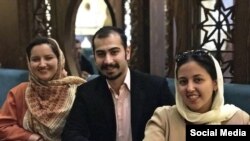The U.S. State Department has released its annual report on the state of religious freedom around the world. The picture of Iran that emerges is a grim one, particularly for religious minorities, as Ambassador at Large for International Religious Freedom Sam Brownback noted at the report’s release:
“We hear and see horrific reports coming out of Iran on the lack of religious freedom and the persecution of people that aren’t in the majority faith stream and practicing as the government directs, and we see a radical export of that philosophy as well out of Iran and trouble in many other countries in the Middle East.”
According to the report, Baha’is in Iran continued to face severe government and societal discrimination. Nearly one hundred Baha’is remained in prison solely because of their faith. In November, a court sentenced three Baha’i students who were barred from university studies, Rouhieh Safajoo, Sarmad Shadabi, and Tara Houshmand, to five years in prison for being Baha’i. There were reports of authorities placing restrictions on Baha’i businesses or forcing them to shut down, and continued instances of desecration of their cemeteries.
Christians, particularly evangelicals and converts from Islam, continue to experience disproportionate levels of arrests and detentions. Numerous Christians were charged in connection to their religious beliefs and activities and sentenced to prison, including Pastor Youcef Nadarkhani and Victor Bet Tamraz. Ebrahim Firouzi continued to serve a five-year prison sentence for converting to and practicing Christianity, and related missionary activities.
At least six Gonabadi dervishes faced imprisonment on convictions of “waging war against the state” and “following a deviant sect.” There were also reports of arrests and harassment of Sunni clerics and congregants, including theJune trial of Hassan Amini, Secretary General of Iran’s Council of Sunni Theologians, on charges of “propaganda against the state.” Authorities continued to discriminate against the Sabean-Mandaean and Yarsan religious communities as well.
Ambassador Brownback said that freedom of religion is a foundational human right that no government has the right to repress, and that every government has the duty to protect. A key goal of the United States, he said, is to promote religious freedom for all people. That includes members of religious minorities in Iran. “We all have a stake in this fight,” Ambassador Brownback declared. “We must move religious freedom forward. We must defend it in every corner of the globe.”














